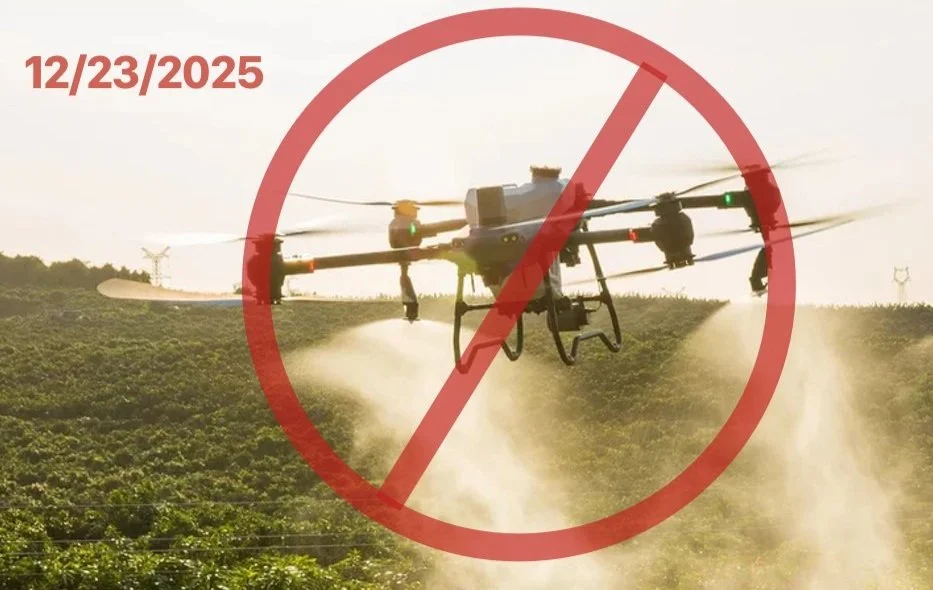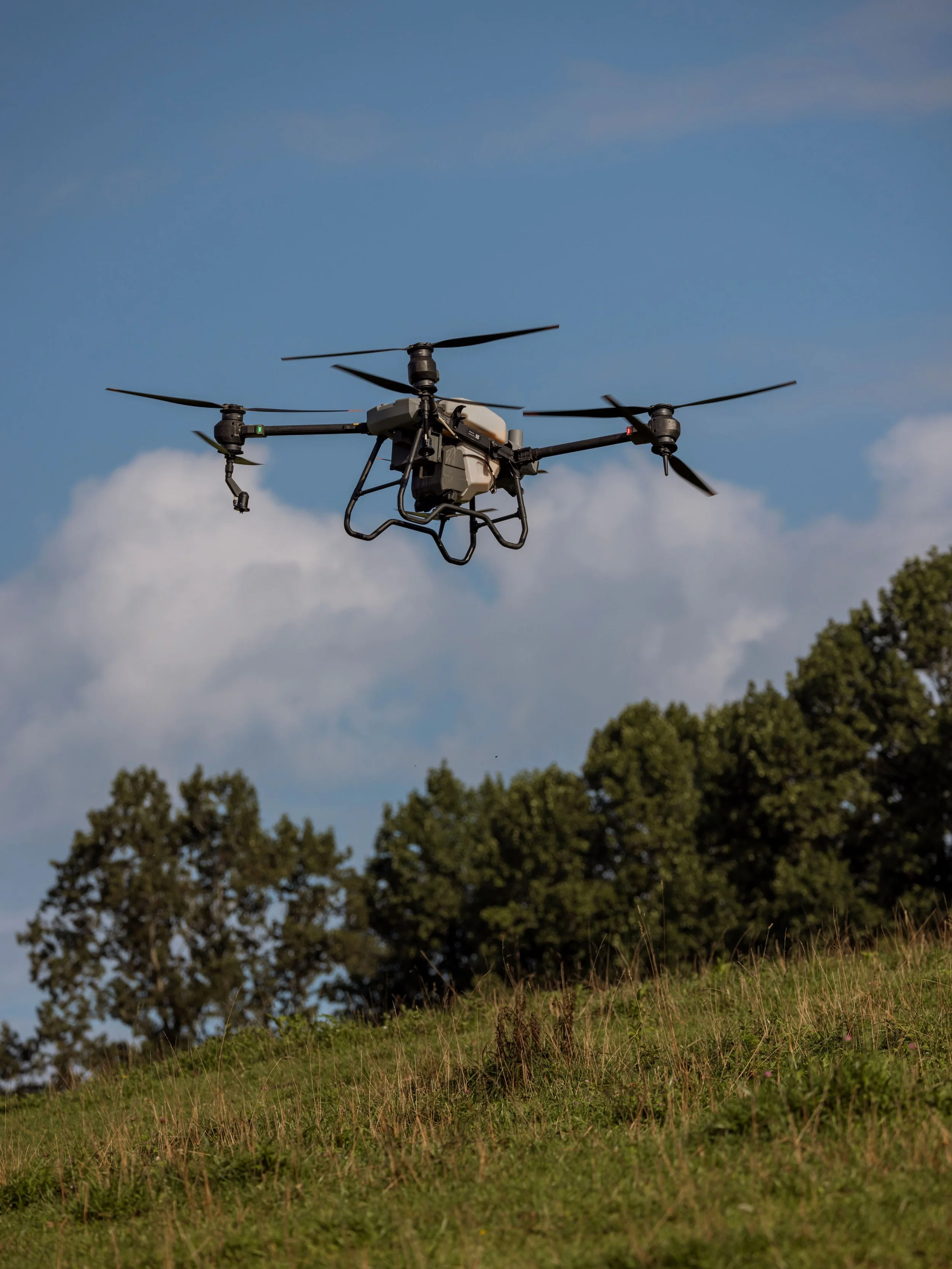
Section 1709 of the 2025 NDAA and the DJI and Autel Ban
There are a variety of conflicting narratives regarding the consequences of § 1709 of the 2025 NDAA. As the voice of the agricultural drone industry on Capitol Hill, our analysis below will hopefully bring some clarity to this critical legislation.
All About § 1709
When speaking with people across the drone industry, there are a variety of conflicting narratives regarding the consequences of § 1709.
This page seeks to address those misconceptions.
Does § 1709 Ban DJI and Autel?
Section 1709 does not explicitly ban DJI and Autel. Technically, it only orders that a to-be-named agency evaluate whether they should be placed on the FCC’s Entities List (more on that below). The reason ADI is so confident DJI and Autel will be banned is that § 1709 requires a report to Congress if the appointed agency does not find DJI and Autel to be a threat, and, further, opens evaluation to any other agency to make that determination if the first agency does not find it to be a threat. That is accepted as tacit instructions from Congress to return an affirmative finding.
If DJI and Autel are placed on the FCC’s Entities list, their new drones cannot be granted licenses and all licenses granted after February of 2023 will be automatically revoked - but what about the drones that are currently owned in the U.S?
Four Critical Things to Understand About § 1709 of the 2025 NDAA
1 - DJI and Autel (and their subsidiaries) are to be evaluated by a yet-to-be-named agency for their threat to U.S. national security (§ 1709(a)(1)).
2 - If said evaluation finds DJI and Autel are threats to national security DJI and Autel will be placed on the FCC’s Entities List within 30 days of that finding (§ 1709(b)(1)(A)).
3 - If there is a favorable finding for either company that they should not be put on the list, any other agency has 180 days to submit a report that they find either company to be a threat (§ 1709(b)(2)). In some ways this is the most damning provision, even if one agency lets them off, many other agencies get a de facto bite at the apple.
4 - If said evaluation does not occur, DJI and Autel will be placed on the FCC’s Entities List by default in December of 2025 (§ 1709(a)(2)).
Section 1709 of the 2025 NDAA Will Lead to a Ban on DJI & Autel
The 2025 NDAA contains a slightly modified version of Rep. Stefanik’s H.R. 2864, which will all but certainly ban DJI and Autel drones from operating in the U.S. and likely result in a ban on some drones already purchased, based on comments in FCC Report 22-84 from 2023. Section 1709 of the 2025 NDAA directs ‘an appropriate national security agency’ to determine whether Autel and DJI ‘pose an unacceptable risk to the national security of the United States.’
Given that the DOD has barred the use of DJI over its bases and by its personnel since 2018, combined with the high level of anti-CCP and anti-DJI sentiment in Congress, it is nearly inconceivable that the appointed agency returns a positive finding for DJI and Autel to continue to operate in the U.S. Furthermore, if the appointed agency finds either company is not a threat, § 1709 gives other agencies 180 days to perform their own evaluations and place them on the Entities List anyways. This makes it a near certainty that at the end of the year, DJI, Autel, and Anzu drones will all be on the FCC’s Entities List (a ban on DJI would cover Anzu Drones as well, as they have been functionally identified as a DJI subsidiary by the House of Representatives).
While ADI does not advocate in favor of any bans on agricultural drones, we are dedicated to supporting American drone companies and are engaging with policy-makers to ask that this ban not adversely harm American drone operators and farmers. As such, ADI is advocating for Americans to receive reimbursements under 47 U.S.C. § 1603 when they replace their banned drones with American agricultural drones, which helps both operators and American drone manufacturers.
What about DJI and Autel Drones I own already?
This is a harder question to answer immediately, but the FCC has laid the foundation for an eventual ban.
First, for all equipment on the FCC’s Entities List, any license granted after February of 2023 would be revoked automatically, with other, older licenses potentially being revoked later on (the FCC has clearly determined they have the authority to revoke licenses, but have not decided to act on that authority yet).
Once on the Entities List, the import of covered equipment will be banned. While batteries and other ancillary hardware will not be banned by placement on the Entities List (they are not ‘communications equipment’ technically) they may be barred under the other import restrictions DJI is already facing (such as the UHRPA import challenge and the current soft-ban). Of course, once the available battery supply is exhausted, the drones will be useless.
Placement on the Entities List Would Function as an Import Ban
While many outlets are reporting that the language in the NDAA is not a ban on equipment currently owned and operated in the U.S., that analysis ignores FCC Report 22-84, published in February 2023, in which the FCC stated that any license granted after February of 2023 to a company on the Entities List would be revoked. Further the FCC held that they had the right to retroactively revoke any historic licenses which have been granted to companies on the Entities List (pg. 46, § III(B)(6)(102-03) & (b)(114-118)). This is a major concern, as drones are the first equipment on the entities list not hardwired into the national telecommunications infrastructure, and the language in 22-84 makes clear that the FFC sees license revocation as an authority that will continue to expand retroactively as the scope of the Entities List expands (pg. 47 - §III(C)(121)).
When Will DJI and Autel be Listed?
While ADI had originally projected that DJI and Autel would be placed on the Entities list by mid-year, given the budget cuts from DOGE and general gridlock on Capitol Hill, it is assumed that the decision has been tacitly made to let the fail-safe provision enact the ban automatically(2025 NDAA § 1709(a)(2)), putting it into effect December 23 of 2025. Once in effect, we expect the FCC to take action against some, if not all FCC licenses already issued to DJI and Autel, once on the list. These will be the first companies to be placed on the Entities List where none of the equipment they produce is directly integrated into our national communications network.
While the FCC has, to date, made a point of not pursuing on non-critical / non-embedded technologies made by companies on the Entities List (see FCC 22-84 pg. 60, note 374), because DJI and Autel do not produce any equipment that is integrated into the telecoms grid, a more aggressive treatment of their products could be expected. This is because if the FCC is trying to attack the ‘critical’ products a company makes, but none of the products DJI or Autel makes fits the current definition of ‘critical’ - therefore the two choices are to make the addition meaningless or expand the definition of ‘critical’ (see also Lib. of Cong. ISBN 0737902906, No. 5, parag. 3, Line 14). Put differently, if they present a threat sufficient to bar their future operation, there is potentially a strong argument that they should be barred from currently operating.
A final note - ADI does not claim to be omniscient, and other sources should be consulted and, as with any prediction, we may be wrong, that said, be wary of any analysis that does not reference FCC 22-84, as that is where much of the meat of the Entities List’s rules lay.
While the Agricultural Drone Initiative will never advocate for any drone company to be banned, it is important to pragmatically consider the likely impacts of these policies and it is our assessment that a blanket operational ban should not be counted out.
What is the Entities List?
The FCC's Banned Entities List under 47 U.S.C. § 1600-1609 (the Secure and Trusted Communications Networks Act of 2019) is a list of entities that are prohibited from acquiring, importing, or exporting telecommunications equipment or services in the United States. These entities are typically designated as a threat to national security and is a list of communications equipment and services that have been determined to pose an unacceptable risk to U.S. national security or the security and safety of U.S. persons.
The Entities List identifies telecommunications equipment and services that are prohibited from being used in U.S. communications networks. Originally the List was limited equipment used by companies which received federal funding. After the promulgation of FCC 22-84A1 (see section above) it was expanded to bar all equipment on the list from operating in the U.S. Equipment and services are added to the list based on determinations made by various U.S. government entities, including the Department of Commerce, Department of Defense, and the intelligence community.
The Entities List is part of broader efforts by the U.S. government to secure telecommunications infrastructure against potential foreign threats, particularly those that might enable espionage or cyberattacks.
What’s Next
While it is unclear when the final determination will be made, it is likely to be when the fail-safe provision kicks in on December 23 of 2025.
The most critical next step for the agricultural drone industry is to engage with Congress to support American drone companies and advocate for tax incentives and rebate programs to ensure that the early advocates for agricultural drones that bought these products are not left behind, unintentionally harmed by larger national security concerns. There is an appetite in Congress to help, and we can make a difference - if we join together and present our arguments as a unified group.




